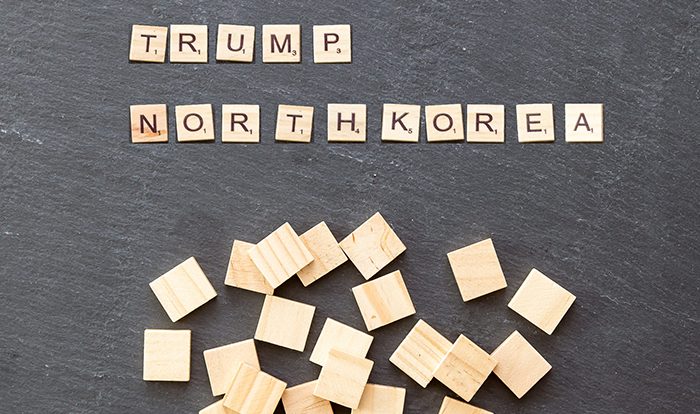
Pundits, reflecting on a surprising event of the 1970s, often say: “only Nixon could go to China”. Now, perhaps we can take a lesson from history and say that only Trump can go to North Korea. Sometimes it takes a right-wing politician to do the job of a left-wing one (and vice-versa). Before Trump’s announcement that he would meet with Kim Jong-un there were months of over-the-top soap opera developments full of creative threats and insults (“fire and fury”, “total destruction”, “my nuclear button is bigger than yours”, “rocket man”, “mentally damaged old man”, etc.), tensions (several nuclear and missile tests by Pyongyang and Joint Military exercises in the Korean Peninsula by Washington), emotional encounters (how to be insensitive to the image of the two Koreans marching and playing together at the Pyeongchang Winter Olympics?) and even comic relief in the form of internet memes. But now North Korea and the US are, surprisingly, at the verge of holding an unprecedented summit, under the premise of discussing the denuclearization of the Korean Peninsula.
Despite the narrative of the Trump administration insisting that no concessions were made to arrange the summit, the meeting itself is a concession from the American side. In fact, it can be portrayed as Kim’s victory. By accepting Pyongyang’s invitation, the US is awarding the North Korean government the status that it has been seeking for decades: as a legitimate nuclear power that major powers must negotiate with. The context of the summit is helpful in this sense, especially the rising tensions between the major powers in the Asia-Pacific region. Examples can be drawn from Xi Jinping and China’s Military buildup in South China Sea, Shinzo Abe’s Japan attempts to change its peaceful constitution, and Vladimir Putin’s Russia assertive foreign policy, just to name a few. They are all members of the Six Party Talks about the nuclear program and all regard a nuclear North Korea an unwelcome development in a region that already has too many troubles.
Arguably, South Korea’s diplomatic handling of the current diplomatic rollercoaster on the peninsula has been more conscious and creative than Trump’s. Much of that has the figure of South Korea’s President, Moon Jae-in, to thank for. As a liberal human rights lawyer and holder of a personal and emotional history connecting to the northern part of the peninsula, Moon took an active role on negotiations with the North. It was Moon that sent the invitation to the North Korean delegation to take part in the Olympic Games festivities (an act coldly received by Pyongyang on initial stages that took a lot of diplomatic – and financial – effort to take place). It was also Moon that appointed a South Korean delegation that made a rare official trip to Pyongyang in March. Also motivated by his political direction, the South Korean Ministry of Unification assembled an artistic troupe of over 160 South Korean performers to put on a show in Pyongyang: an initiative filled with some of Korea’s most successful K-pop performers.
Moon’s initiatives are not exactly new; they emulate much of the so-called “sunshine policy”- the political idea that it would be much easier to deal with the rebellious north by being warm and generous than by using threats and sanctions. During Rho’s era, factories and resorts were opened in the Demilitarized Zone (DMZ) border and jointly operated by the Koreas while talks took place. It is, however, a welcome change in pace towards inter-Korean relations replacing the dry spell of progressive leadership and consecutive conservative governments (Lee Myung-bak and the impeached Park Geun-hye) that halted most projects that focused on peaceful dialogue with North Korea. While some are pessimistic and give a cloudy forecast for Moon’s Sunshine Policy 2.0, translated so far by the growing number of diplomatic goodwill gestures and diplomatic visits, it is undeniable that the role played by South Korea is far greater than it seems.
China is North Korea’s only major ally, but relations between Beijing and Pyongyang are far from simple and easy. Today, regional rivalries remain a strong incentive for Beijing to keep Korea divided. In the past, as North Korea faced famine and severe economic trouble in the 1990s, China’s main concerns were to help maintain the survival of the allied regime and at the same time engage in the Six Party-Talks international negotiations to curb Pyongyang’s atomic ambitions. The Chinese provided foreign aid, especially in food and energy, and bilateral trade reached a sizable US$6 billion. However, China and North Korea have recently been through difficult times in their alliance as Beijing supported a raft of progressively deepening UN sanctions on Pyongyang and criticized its nuclear and missile tests. In 2017, a North Korean test was even conducted during the BRICS summit in Xiamen – an embarrassing moment for the Chinese government. As president Xi Jinping aims to be recognized a global statesman who defends stability and multilateral institutions, North Korea’s behavior has become a constant thorn in his side, and it is no surprise that Kim’s first official foreign visit was made to China, most likely to smooth out the diplomatic situation and secure Chinese backing for Korea at the upcoming summit with the US.
In sum, Kim’s visit to China and the regular contact between the two Koreas suggest that the situation in 2018 resembles the best starting point for a successful multilateral deal with North Korea since the 1900s. The mere possibility of a summit is already a major step forward, taking the US and North Korea out of the deadlock of the last decade.
Further Reading on E-International Relations
- Trump’s ‘Personalised’ North Korea Policy: 2018–2020 and the Way Forward
- Opinion – North Korea’s Nuclear Tests and Potential Human Rights Violations
- How the American Public Views Nuclear North Korea
- Opinion – North Korea’s Gambit in the Russia-Ukraine War
- Provoking to Avoid War: North Korea’s Hybrid Security Strategies
- Opinion – Remembering North Korea’s Human Side